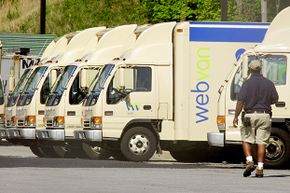In the relatively short history of the Internet, there have been a lot of failed businesses. For every spectacularly public bomb (we're looking at you, Pets.com), there are untold numbers of companies that started small and folded quietly. But it might be unfair to say that the list you're about to read is a collection of bad business ideas. In some cases, sure, the concept behind the company was so ridiculous and out of touch that the company was doomed to failure. But plenty of the ideas were perfectly good — the business just didn't make it.
Many of these defunct companies had the same problems that traditional businesses do. But online businesses, particularly the first explosion of them in the 1990s and early 2000s, seemed to more frequently have an extra dose of a deadly combination: unsustainable business model, shaky corporate structure and out-of-control spending. A surprising number of these ideas were viable, but the timing just wasn't right — maybe the technological infrastructure wasn't up to par, or the audience wasn't ready for it. Many of these ideas ended up reappearing years later with better execution, or when the public could finally handle the concept. Let's take a walk down memory lane of Internet failures.
Advertisement










